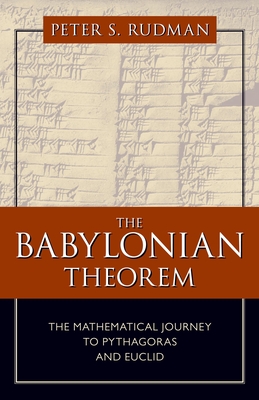The Babylonian Theorem: The Mathematical Journey to Pythagoras and Euclid

The Babylonian Theorem: The Mathematical Journey to Pythagoras and Euclid
A physicist explores the history of mathematics among the Babylonians and Egyptians, showing how their scribes in the era from 2000 to 1600 BCE used visualizations of plane geometric figures to invent geometric algebra, even solving problems that we now do by quadratic algebra. Rudman traces the evolution of mathematics from the metric geometric algebra of Babylon and Egypt-which used numeric quantities on diagrams as a means to work out problems-to the nonmetric geometric algebra of Euclid (ca. 300 BCE). From his analysis of Babylonian geometric algebra, the author formulates a Babylonian Theorem, which he demonstrates was used to derive the Pythagorean Theorem, about a millennium before its purported discovery by Pythagoras. He also concludes that what enabled the Greek mathematicians to surpass their predecessors was the insertion of alphabetic notation onto geometric figures. Such symbolic notation was natural for users of an alphabetic language, but was impossible for the Babylonians and Egyptians, whose writing systems (cuneiform and hieroglyphics, respectively) were not alphabetic. This is a masterful, fascinating, and entertaining book, which will interest both math enthusiasts and students of history.
PRP: 255.23 Lei
Acesta este Prețul Recomandat de Producător. Prețul de vânzare al produsului este afișat mai jos.
204.18Lei
204.18Lei
255.23 LeiLivrare in 2-4 saptamani
Descrierea produsului
A physicist explores the history of mathematics among the Babylonians and Egyptians, showing how their scribes in the era from 2000 to 1600 BCE used visualizations of plane geometric figures to invent geometric algebra, even solving problems that we now do by quadratic algebra. Rudman traces the evolution of mathematics from the metric geometric algebra of Babylon and Egypt-which used numeric quantities on diagrams as a means to work out problems-to the nonmetric geometric algebra of Euclid (ca. 300 BCE). From his analysis of Babylonian geometric algebra, the author formulates a Babylonian Theorem, which he demonstrates was used to derive the Pythagorean Theorem, about a millennium before its purported discovery by Pythagoras. He also concludes that what enabled the Greek mathematicians to surpass their predecessors was the insertion of alphabetic notation onto geometric figures. Such symbolic notation was natural for users of an alphabetic language, but was impossible for the Babylonians and Egyptians, whose writing systems (cuneiform and hieroglyphics, respectively) were not alphabetic. This is a masterful, fascinating, and entertaining book, which will interest both math enthusiasts and students of history.
Detaliile produsului









